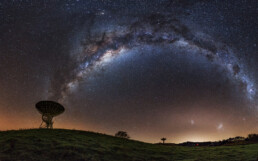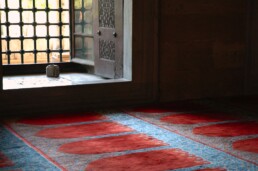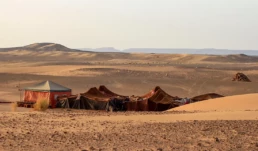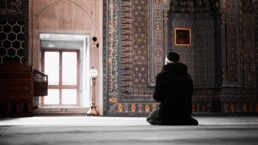Where is God?
Being stuck in a rut is one of many expressions used by Muslims these days. Besides a generally negative outlook it ingrains an unproductive attitude that makes becoming unstuck increasingly difficult. Many put it down to the current political climate, and while the lens of securitisation has certainly generated unease around religious expression, to pile our woes at the feet of politicians might be offering them a bit too much.
In reality, there is a simple reason and remarkably one many fail to pinpoint (itself a symptom of the problem) and that is figuring out where exactly God fits into the equation. These days, nearly every discussion on Muslims or Islam has God missing from it. That’s not to say that our discussions do not insinuate something about God, but our inferences treat the divine as a presumed variable rather than the primary motive. Even where we articulate something being for God, actual engagement with such sentiment fails to extend beyond routine expressions. How often do we ask: “Well if this is for God, how do I know it’s what He wants, and in the way that He wants it?”
A closer inspection suggests that our association with God seems to be cosmetic, and when we get around to addressing that association it tends to be superficially in a communal setting. Collective religiosity is fine but it has to be complemented with an intimate and personal association,
Thoughts on refuting claimants to "traditionalism"
This post is a thread on the problematic ways in which we respond to religious refutations from so called traditionalists. Often it's pointless, and the 'traditionalism' many claim to espouse in our context is simply unschooled rhetoric coming from ethno-cultural anxieties.
- The way we construct responses often resorts to playing their game and inevitably fall into the quagmire we seek to free ourselves from. Our responses play the citation game rather than approach the topic from a perspective that explores the topic in a reasoned way. It plays up to the fallacious game and invites inanity.
- Such interlocutors neither debate nor explore, but present only that which is argumentative, concentrating on minutiae or picking apart an argument in a way that is irrelevant to the generality of the propositions presented. They resort to ad hominem and attacks which clearly exhibit their sectarian interests. They weaponise citations, imputing into past scholars their own sectarian intent.
- Their ‘brand’ of doing religion is the worst and most regressive: they butcher the efforts of the classical scholars, ignore what they were trying to do (or make up an alternative narrative) and consistently present us with a fiqh that leads nowhere or makes things worse, impedes the strengthening of the believers or the cause of God, and any other optimum outcome.
- It’s as if they are determined to hold the progressions of the believers back, often relying on explanations that mirror irrational Christian medieval doctrines that God has never advocated in the Qur’an. They are completely insular from wider society and even other Muslims, sitting in sectarian mosques, madrasahs and Islamic universities with absolutely no cognisance of what actually exists in societies around the world.
- The reality they relate to is some fairytale they have constructed in their minds, the complexities of modern post-industrial living is as alien to them as they are to us. In fact this is no religious battle but a cultural one, and their use of disparaging terms such as modernists etc isn’t really to do with one era or epoch against another (past vs present), but actually about regions - their problem tends to be that we’re not being Asian (or Eastern) enough either in our looks, practice or understanding.
- It’s a showcase of the worst of what knowledge can be used for; bickering, puerile name calling, and tearing down any attempt to actually operationalise what God has revealed. They want to force Muslims into disengaging with the world around them, often to legitimise their own disengagement which comes from their lack of understanding the shariah and consequent struggle to implement and apply revelation to today.
- It can be quite futile in engaging in a scholarly discussion because the mufti/maulana/shaikh (whatever mantle he claims to occupy) clearly does not know how to engage like one, nor do they seem to know what scholarship actually is. And our mere citing against their citations is not only pointless, its boring and circular, and a game we could play forever. This method to fiqh never resolves anything (I did it for years and learned my lesson) and only exists as a rhetorical tool for one-upmanship, something (may God guide us) we should have little interest in.
What's the water under God's throne?
“It is He who created the heavens and the earth in six periods, and His throne extends over the water, so as to test which of you does best…”
Qur'an 11:7
This post explores what God might mean by ‘waters’. As a caveat I’m not suggesting that what I’m about to present is a conclusive interpretation, it’s simply an exploration which is all we can really do with such verses, and I often enjoy intelligent godly theories presented by others. I don’t believe there’s a need to be conclusive with such reports (akhbar) - God did not provide us with the finer details precisely because He wants us to use our intellects and ponder the cosmos in a way that inspires deep reverence and awe, which is relative to the individual since the depth people require is personal.
What prompted these thoughts, as with all scholarly insights I suppose, were initial questions such as does 'water' here refer to the type on earth, like a lake or ocean floating about somewhere out there? Of course, put like this it sounds quite bizarre. One thing we tend to overlook when it comes to things beyond our immediate perceptions is that whilst God uses human representations for things out there (how else would humans understand what was being said?) it does not mean that their absolute reality is as humans understand the representations. Even in this verse, when God uses the term ‘throne’, no sensible person claims that God is sitting (as a human does) on a giant throne made of wood, metal or jewels which is simply floating about somewhere beyond the universe. It’d be somewhat anatopistic, that is, something out of its proper place. But then why would God choose the word throne (or ‘arsh in Arabic)? Well reasonably, because what God is literally talking about is best represented to the average human mind through a word she already recognises.
So hopefully having made that clear, what might the ‘water’ over which the throne sits be? A new experiment, the findings of which were published last week in Nature, confirms the existence of “superionic ice” with Quanta Magazine reporting that ‘Across the solar system, at least, more water probably exists as superionic ice — filling the interiors of Uranus and Neptune — than in any other phase, including the liquid form sloshing in oceans on Earth, Europa and Enceladus…All the previously known water ices are made of intact water molecules, each with one oxygen atom linked to two hydrogens. But superionic ice, the new measurements confirm, isn’t like that. It exists in a sort of surrealist limbo, part solid, part liquid. Individual water molecules break apart. The oxygen atoms form a cubic lattice, but the hydrogen atoms spill free, flowing like a liquid through the rigid cage of oxygens.’ However, ‘Depending on whom you ask, superionic ice is either another addition to water’s already cluttered array of avatars or something even stranger. Because its water molecules break apart, said the physicist Livia Bove of France’s National Center for Scientific Research and Pierre and Marie Curie University, it’s not quite a new phase of water. “It’s really a new state of matter,” she said, “which is rather spectacular.”’ To be clear, I’m not saying the water beneath the throne is superionic ice for sure but I’m exploring (as the sahabah and scholars after them would characteristically do) the idea that it could possibly be a type of superionic ice, but also quite plausibly, a completely new state of matter that we have yet to come across - or even conceive of.
Can we know more, and did the Prophet tell us anything? Well interestingly, al-Bukhari reports that the Prophet began to explain the affairs of the beginning of creation, but it was missed by Imran b. Husayn as he was called away! A delegation from Yemen came to see the Prophet saying, “We come offering peace to the messenger of God, to learn about the faith, and to ask how all of this began?” The Prophet began to explain, “God was present and there was nothing else (of the cosmos) besides Him, and the throne was above the water, and He wrote in the dhikr before everything occurred, then He created the seven heavens.” Imran b. Husayn was then called away to his camel which had run off and resultantly missed the rest of the explanation. He lamented afterwards, “I wish I had left the camel!”
We haven’t much related to us from the Prophet in regards to what the water is, and we don’t know whether he touched upon it whilst Imran b. Husayn was absent. However, it seems the conversation amongst the sahabah didn’t stop there. Sa’eed b. Jubayr relates that the prophetic companion Abdullah b. Abbas was asked in reference to this verse, “and what is the water on?” He replied, “a wind,” which if it was something he was relating from the Prophet (and not his own ijhtihad), might refer to a vast ocean of cosmic charged particles which sits under the ‘water’.
But what’s the purpose of all of this? Here we are called on to ponder the magnitude of God’s creation - we know how colossal the Pacific Ocean is, so imagine a superionic ice that extends for trillions (to the power of trillions, and far far more) lights years! To even begin to contemplate magnitude and reality here is mind-boggling, and it ought to bear on us the insignificance of man and his affairs, or the nature of the power he foolishly thinks he has. It induces a far deeper consideration of the oft-repeated phrase ‘God is great.’
In this way, the possible meaning of the continuing verse “so as to test which of you does best” is that God tells us of the throne and the waters “to try his servants to consider and deduce (values) such as His complete (divine) abilities and the resurrection of the soul” as al-Qurtubi suggests, and then to use the faculties of the intellect as Qatadah put it, to recognise God’s supreme majesty rather than ignoring what such knowledge suggests and living out a life devoid of God. al-Dah’hak opined that “does best” means offers the most appreciation,” ostensibly from considering and deducing such values. The use of the intellect and a show of appreciation to God are two fundamental principles that flow through the Book of God, and sit centrally in the meta-narrative that informs our existential purpose, something I hope to map out gradually for believers seeking a holistic understanding of their relationship and engagement with the Most High.
Are the devils literally chained up during Ramadan?
It’s commonly held that because the devils are chained up during Ramadan, anything bad that is done is entirely from the perpetrator, the devil cannot be blamed since he was not present nor working his misguidance. This view is taken from the following hadith (prophetic narration) reported by Abu Hurairah:
“When Ramadan comes, the gates of paradise are opened, the gates of hell are closed, and the devils are chained up.”
al-Bukhari and Muslim
In short, this hadith can be taken (for brevity) in two ways since there doesn’t seem to be much context related around it.
What is Salah?
Salah is the ultimate expression of subservience to the Most High, ordained by God from the earliest times of Sapiens' existence (Q 42:13), and both a physical and cognitive display of deep humility and reverential awe for the Lord of all that exists.
It requires the one who is subservient to express it by standing before his Lord, bowing to his King, and to bow down on the ground in total surrender with his face to the floor out of abject humility (Q 17:109). It incorporates praise, thanks, humility and purification for the Most High (Q 2:30). It demands engagement and contemplation of God's words (Q 73:20). It requires sincere self-effacement and a heart that palpitates at the idea of God's eternal and unfathomable supremacy as well as one's own shortcomings in fully recognising that supremacy.
It's often said "You need to just pray", or people are emotionally impelled to salah through warnings of eternal damnation. In contemporary times where identity politics becomes a key motivator, the doctrinal "If you don't pray you're not a Muslim" argument has become widespread. Whilst all of these have precedent in some way within the nusus or doctrinal tradition, they do not reflect the central way in which God spurs man to stand before Him at appointed times throughout the day.
There's a reason as to why God repeatedly tells us about His acts of creation, from the heavens and the earth, to living organisms within them, and sentient life forms beyond. God invites the human intellect to ponder over a cosmos teeming with life and order in order to discover His supreme greatness, and to recognise that the one who gives life is also alive, ever-present, ever-active in the affairs of all things.
We have life, we have love, and we have hardships. Throughout all of these there is one principle God says, and that is to remember God (Q 20:14) giving thanks (Q 4:147). To stand before God a few times, for a few moments in the waking day, is to express appreciation for what we have and to request more. It's to show God that we individually care, that we are compelled by His utmost majesty and spectacular power, His blinding glory and limitless grace, and that we desire the personal relationship He reserves with each and every sincere servant. Everything else is sophistry and tangential.
Of course, to understand salah like this necessitates knowing God. The condition and constitution of one's salah is reflected by one's understanding of the Most High, which in turn represents the nature of the relationship between the servant and her Master.
On another note, I wouldn't call salat 'prayer', not because it's wrong per se but because it fails to capture the entirety of what God wants. In modern times, prayer can simply refer to an invocation, and often evokes images of people doing ritualisms that they can't entirely explain or justify. In no way does the Salat represent this - it is the highest and most intimate expression of subservience for those on the creed of Abraham. This ought to resonate with anyone of any Abrahamic faith, the salah was ordained to every prophetic nation.
I acknowledge that there's a lot to unpack here (which I do in seminars, workshops and lectures), but what I hope to briefly touch upon is that profound subservience to God through salat is predicated on our knowledge of God and also what He ultimately wants, to serve God properly requires this knowledge (at least at a basic level) and contemplation.
Indeed, the creed of Abraham is a thinking one, fully appreciated by intelligent folk.
Are you a Muslim or a Believer?
In the Qur’an God, speaks about faith/imaan from various perspectives. One that is highly relevant to the ways in which we identify faith and the faithful today lies in the Qur'an (49:14), where God distinguishes between 'Muslim’ as a political identity and those who truly believe.
God's standards in our understandings and practices
This post is about some of the responses I receive from both the Muslim laity and preachers when speaking about the God's code in a holistic way.
Articulating beliefs in the modern context
When discussing entities of a metaphysical nature our presentations tend to be abstract, binary and devoid of real-world meaning. Often it is absurdly supposed that simply saying something stands as evidence for its existence. With the current political backdrop that frames Muslims with the lens of securitisation, many believers have come to take what they view as a muscular approach to belief – that we believe in metaphysical entities because we must, and no one shall tell us otherwise; like those who insist that we accept militant secularism, both are allergic to debate and discussion. Whilst we might comprehend the reasons behind why some Muslims take this approach, it does not mean that it is correct.
Easing religious hardship, but how?
Across all spectrums of the religious scale, it is held by most that the religious principle of making things easy requires curbing aspects of the shari'ah. Of course, in many instances it does, but it is not a necessary given. The understanding that ease requires some sort of cutback has become axiomatic, even those who doggedly refuse any notion of moderation – usually of the literalist kind – take the hadith to be a reference to legal concessions (rukhas). This tends to be due to the widespread religious culture of viewing most things, including religious ease and hardship, only through a legalistic (fiqhi) lens.
Claiming ‘Orthodoxy’
A few colleagues who have graduated from British religious seminaries (Dar-ul-ulum), as well as Madinah, Umm Al Qura and Al Azhar universities recently intimated their deep unease with the existing scattered approach to claiming Islamic ‘orthodoxy’. A vague term used to establish legitimacy and usually built on very shaky grounds, the term has replaced what used to be the notion of a good and solid argument, and much of this is down to the parochial mind set and sectarianism ‘leaders’ implicitly or explicitly endorse. One Dar-ul-ulum graduate mentioned that he is derogatorily called open-minded by his colleagues, as if there is any universe in which such a thing might be bad. Unfortunately, the inability to systematically reason and behave appropriately in particular situations is neither new to current times nor will it suddenly disappear, the Hanbali jurist and hadith master Ibn al-Jawzi lamented in his own time saying, ‘I saw a group of those who ascribe themselves to knowledge acting like the laity.’











